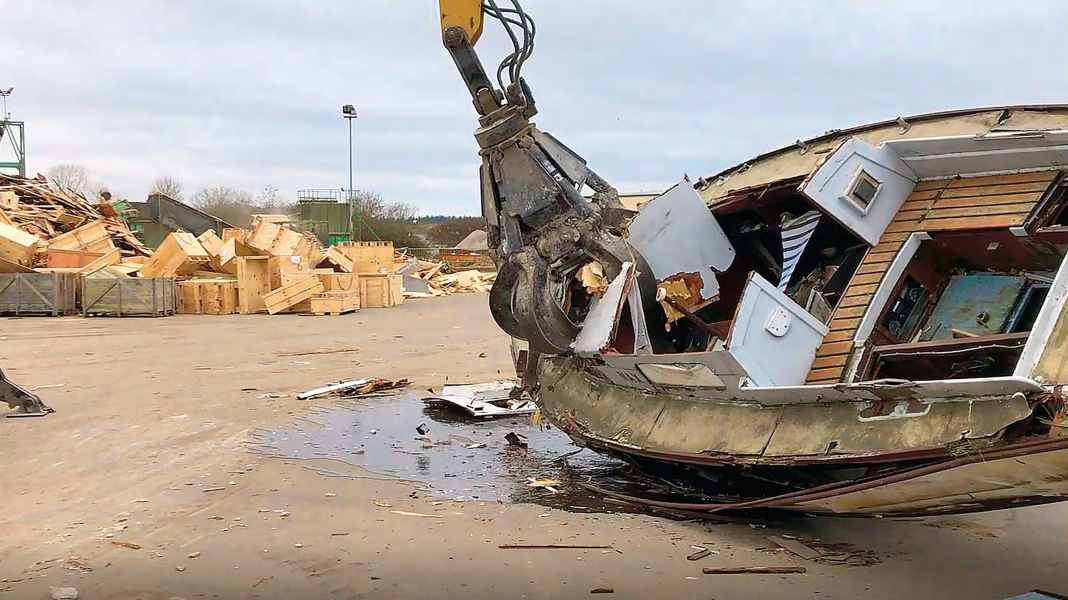
Nothing lasts forever - not even the life of old boats. But what to do with them when they are no longer usable? There is no clear answer to this in Germany. The rules for dealing with scrap boats are inconsistent. The problem: while wood or metals can be easily recycled, glass fibre reinforced plastic (GRP) is difficult to recycle. The reason is that the glass fibres can hardly be separated from the resin. This leads to complex processes and high costs.
Give away instead of scrapping
One way to get rid of the boats: Owners give their boats away, hoping that they will be rescued by hobbyists and enthusiasts. Adverts with the words "for sale" therefore regularly appear on platforms for used boats. A recent example is an S30 warping cruiser from 1978. But if there is no response to such an offer, the path inevitably leads to expensive scrapping.
The dilemma with the scrap boats
But not every owner can or wants to bear these costs. Time and again, owners simply disappear without a trace. The so-called "boat corpses" then become a major problem for shipyards and marinas. They are faced with a dilemma: they are not allowed to remove the boats without the owners' permission, and even if the authorities agree, they are often stuck with the transport costs. As a result, more and more marinas are refusing old ships access to their premises - for example by not lifting them out of the water at all - for fear of not being able to get rid of the boats.
Boat disposal today: GRP shredder as fuel
There are currently only a few ways to recycle boats in Germany. One exception is the Hamburg-based start-up ReBoat. This company dismantled old boats and had the shredded GRP converted into substitute fuels by the Bremen-based waste disposal company Neocomp. Neocomp has since ceased operations. The reason: rising energy prices and insufficient capacity utilisation. ReBoat is now looking for new approaches for the environmentally friendly disposal of boats.
More about boat recycling in Germany:
France shows how boat disposal works
While the scrapping of boats in Germany is still a big problem, the picture is very different in neighbouring France. The non-profit organisation APER (L'Association pour la Plaisance Eco-Responsable) exists there. It was founded in 2009 on the initiative of the French nautical industry association FIN (Fédération des Industries Nautiques) and aims to find solutions for the environmentally friendly scrapping and recycling of boats. With success.
According to APER, it has dismantled and recycled over 13,000 boats since 2019. This is according to updated figures recently published by the organisation. According to the report, 74 per cent of the dismantled boats could be reused - whether through recycling, energy recovery or reuse.
More motorboats than sailboats scrapped
The figures also show which boats were scrapped and who commissioned the scrapping:
These boat types were disposed of:
- Monohull motorboats: 35.83%
- Dinghies (under 6m): 29.59%
- Monohull sailing boats: 28.86%
- Semi-rigid inflatable boats: 3.66%
- Inflatable boats: 0.95%
Who placed the order for scrapping:
- Private individuals: 49.55%
- Sailing clubs: 23.25%
- Water sports professionals: 10.82%
- Regional authorities: 7.14%
- Recreational harbours: 5.17%
- Administration: 2.63%
Financing through environmental levy
Disposal is mainly financed by an environmental levy that is charged when new boats are purchased. In 2024, APER's annual budget totalled 3.3 million euros. Around 35 certified waste management companies operating both in France and in the French overseas territories are involved in this project. The French Sailing Federation (FFVoile) also cooperates with the organisation.
And it goes on: APER says it has received authorisation from the French Ministry of the Environment for the next five years. This emphasises France's pioneering role in this matter. It is the only country in Europe to have such a well-organised and structured industry for the disposal of leisure boats.

